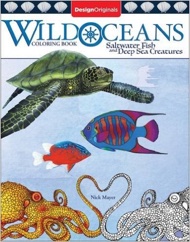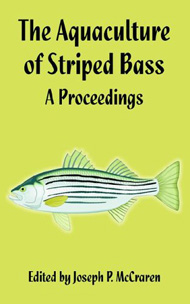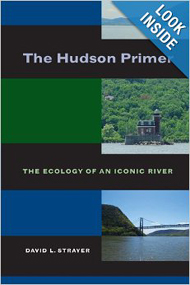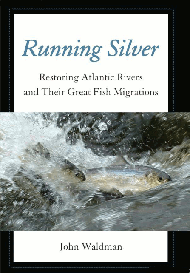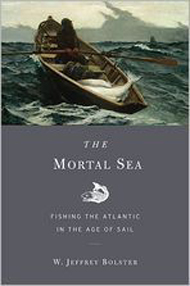
Books About Marine Ecology
A large selection of books about Marine Ecology - things that effect the health of the sea and the fish in the sea - is shown below..
Links are provided to Amazon.com where you can find out more about these books, and if you like, purchase them.
Scroll down to see all the books.
This section describes books about Marine Ecology. These books are about things that affect the sea and the fishing that we all love.
Wild Oceans Coloring Book: Saltwater Fish and Deep Sea Creatures
by Nick Mayer - 2016
Coastal Life Beachcomber Coloring offers dozens of marine illustrations to color that are not only technically accurate, convincing, and powerful, but are also fresh, spontaneous and full of life. These sea life portraits meet the highest standards of anatomic accuracy and knowledge. Nick Mayer knows his subject matter intimately based on a lifetime of study and pursuit of the various species and executes at the highest level. But he fills his imagery with artistic qualities as only a fine artist can do. The end result is some of the very best imagery available today in the field of Sporting Art.
The Aquaculture of Striped Bass: A proceedings - NOAA and U of M - 2006
CONTENTS: Preface Introduction Historical Overview of Striped Bass Culture and Management Life History and Biology of the Striped Bass and Striped Bass Hybrids Culture Requirements for Striped Bass Review of Striped Bass Brood Stock Acquisition, Spawning Methods and Fry Production Striped Bass Culture at Marion Fish Hatchery Observations on Pond Production of Hybrid Bass Fingerlings Intensive Culture of Striped Bass.
The Hudson River Primer: The Ecology
of an Iconic River
by David L. Strayer - 2011
This succinct book gives an intimate view of the day-to-day functioning of a remarkable river that has figured prominently in history and culture�the Hudson, a main artery connecting New York, America, and the world. Writing for a wide audience, David Strayer distills the large body of scientific information about the river into a non-technical overview of its ecology.
Running Silver: Restoring Atlantic Rivers and Their Great Fish Migrations
by John Waldman - 2013
That one could �walk drishod on the backs� of schools of salmon, shad, and other fishes moving up Atlantic coast rivers was a not uncommon kind of description of their migratory runs during early Colonial times. Accounts tell of awe-inspiring numbers of spawners pushing their way upriver, the waters �running silver,� to complete life cycles that once replenished marine fisheries along the Eastern Seaboard. Over the centuries these stocks were so stressed that virtually all are now severely depressed, with many extinct and some simply forgotten. Running Silver is an important and fascinating look at the fish whose history, life-cycles and conservation challenges are so poorly understood.
The Mortal Sea: Fishing the Atlantic
in the Age of Sail
by W.Jeffery Bolster - 2012
Since the Viking ascendancy in the Middle Ages, the Atlantic has shaped the lives of people who depend upon it for survival. And just as surely, people have shaped the Atlantic. In his innovative account of this interdependency, W. Jeffrey Bolster, a historian and professional seafarer, takes us through a millennium-long environmental history of our impact on one of the largest ecosystems in the world.
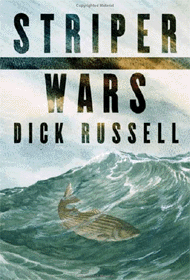
Link to: Amazon.com
Striper Wars
by Dick Russell - 2005
When commercial overfishing sent striped bass populations into free fall in the 1980s, Dick Russell emerged as a key spokesman in a long-shot crusade
by dedicated fishermen to save them. Striper Wars is
Russell�s vibrant account of their thrilling, yet tenuous
victory, complete with heroes and villains. In one
of nature�s great comebacks, groundbreaking moratoriums
allowed the striper population to rebound
more than tenfold. Yet today, the striper
faces new
threats, including a deadly bacterial disease. While
perils persist, Dick Russell�s inspiring account offers fundamental lessons
about the power of civic action and the necessity of a holistic
approach to conservation.
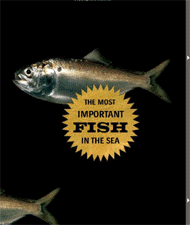
Link to: Amazon.com
The Most Important Fish in the Sea: Menhaden and America
by H. Bruce Franklin - 2007
Franklin, a historian and author of over 15 books (most recently War Stars), was inspired by his passion for saltwater angling to write this history of the all-but-extinct menhaden, a fish that's historically served an essential part of the Atlantic coastal food web, including human populations (natives and settlers both). Integrating his own observations, Franklin spins a grim but compelling tale of the role menhaden play in maintaining critical near-shore habitats, their utility to early Americans and the collapse of their stocks over the past 150 years. Beginning in Maine during the latter half of the 19th century, the menhaden decline has accelerated alongside the nation's economic and technological growth, in particular the increasing sophistication of the fishing industry. Effects are widespread: as the menhaden population thins out, so have bass, bluefish, weakfish and other species, while estuaries suffer catastrophic phytoplankton blooms that create long-lived "dead zones" in which nothing can survive.
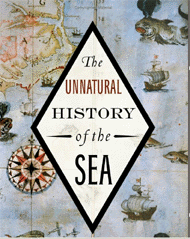
Link to: Amazon.com
The Unnatural History of the Sea
by Callum Roberts - 2007
Marine conservation biologist Roberts presents a devastating account of the effects of fishing on the sea. Once abundant aquatic life has declined to the point where we probably have less than five percent of the total mass of fish that once swam in Europe's seas, he states. Intensive fishing since medieval times has caused this decline gradually over the centuries, so that the fish-deprived sea seems normal to today's generations. Industrial fishing, especially trawling, has virtually eliminated entire habitats, including cod in Canada, oysters in Chesapeake Bay and herring in the North Sea. Now, sophisticated devices such as sonar depth sensors are being used to plunder that last frontier, the deep sea. Callum's alarming conclusion is that by the year 2048, fisheries for all the fish and shellfish species we exploit today will have collapsed.
